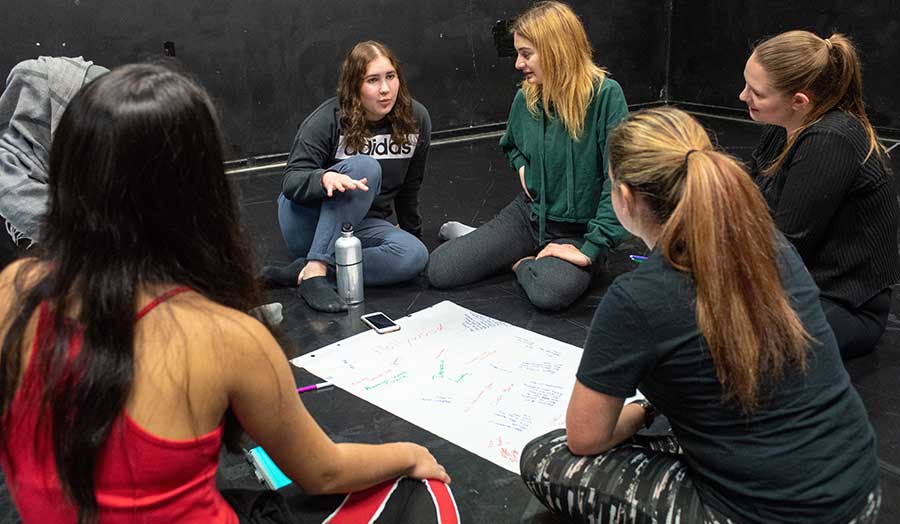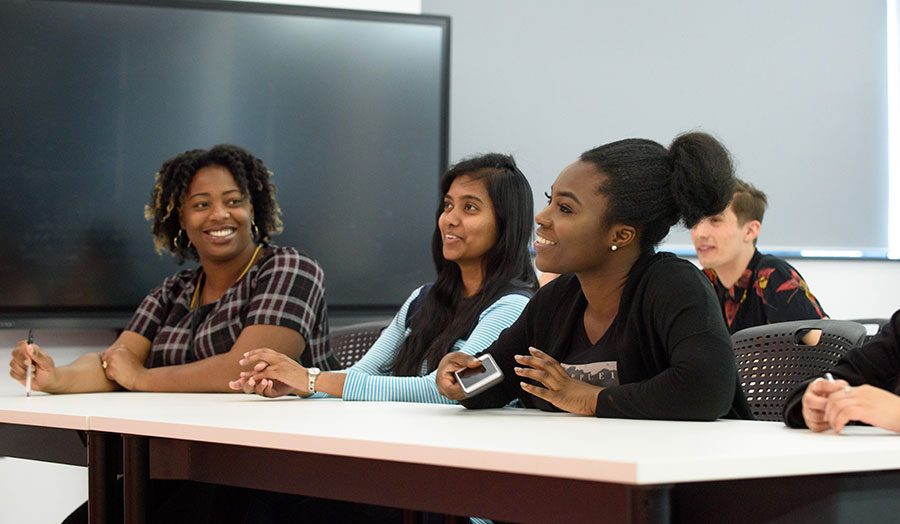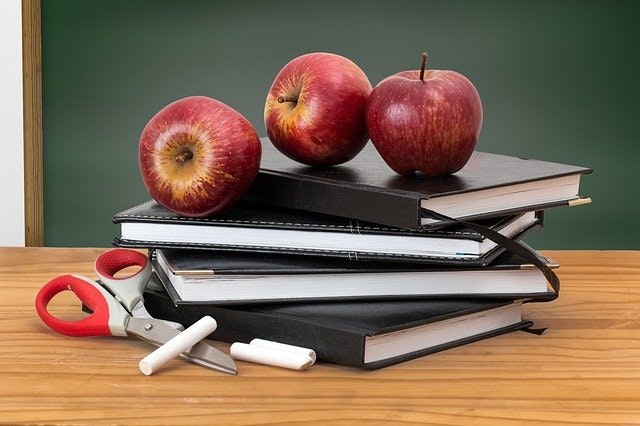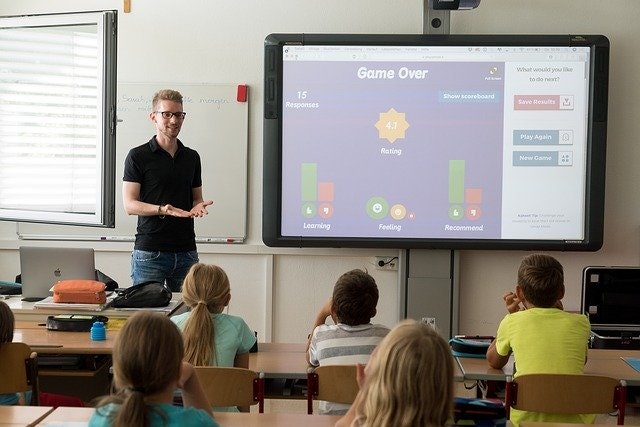- Log in
- Site search

Personal statement for PGCE primary
This is your chance to explain why you want to teach primary age children and convey your enthusiasm for teaching
This example should be used for guidance only. Copying any of this text could significantly harm your chances of securing a place on a course.
Example personal statement for PGCE primary
In my early education, reading and writing were a challenge. At age nine I received a diagnosis of dyslexia bringing with it extra support from the school. This gave me a real determination to overcome my disability. It drove me to study hard, achieve high GCSE and A-level grades and go on to achieve a 2:1 in criminology at the University of England. Although this is not a national curriculum subject, working through and coping with my dyslexia at university helped me nurture my own love of learning. I aim to emulate the support provided to me to ensure that no child is left behind in their learning due to barriers they may experience. I believe that being dyslexic will give me a unique insight into the support requirements of dyslexic children but I am aware that children face many other personal, social and emotional challenges alongside learning disabilities. Recognising these barriers and helping each child to have the confidence to succeed is one goal I hope to achieve as a teacher.
I began spending one day a week, then two days a week in a primary school, which has strengthened my love of learning. I spent time in both Key Stage 1 and 2 classrooms and have so far completed 40 days in a school. I observed lessons such as English, maths, Spanish, science and art, listened to pupils read, and went on to work with small groups. I started to grasp lesson planning and discuss with teachers' current educational issues, such as the changing curriculum. I was able to observe how different teachers handle classroom and behaviour management, particularly picking up on the importance of maintaining an assertive yet sympathetic style. This all shapes my classroom practice to become more effective, for example seeing someone moving up a reading band as a result of the extra time I gave to them. Recently I saw a child making good decisions with their behaviour as a result of the plans we made together. I am gaining experience currently with a year three class of 30 children, working with them one-to-one, in groups and leading the whole class. Learning to think on my feet numerous times a day is challenging but rewarding, especially when I receive positive feedback on my lessons.
For the past two years I have been a volunteer leader with my local Cub Scout group, consisting of 30 boys and girls aged between eight and ten years. This encompasses weekly meetings, trips and overnight camps. During camps, along with the other leaders, I am responsible for the children's physical and emotional wellbeing. I need many of the skills I have seen in the classroom to be an excellent leader. A highlight was being able to use my craft and sewing skills to instigate and lead a mural making project with the completed mural now proudly displayed in the scout hut. Resilience, good judgement, enthusiasm, energy, patience, creativity, responsibility, leadership, reliability and stamina are all essential. Being a volunteer leader has helped me grow my confidence, leadership and communication skills, which I look forward to bringing into the classroom.
Through my studies, work experience and volunteering, I have received and given feedback. I know how essential it is to provide constructive feedback that will help the recipient learn and develop rather than become demoralised. I have witnessed teachers providing meaningful and specific feedback to pupils and how this raises their self-esteem. I have learned from this and practised it in my own interactions with children, with positive results.
I wish to specialise in working with Key Stages 1 and 2 as I feel it is demanding but hugely rewarding to work with children at this vital formative period in their educational development. I am aware that the children within each class could be at vastly different levels in relation to their abilities.. Being able to confidently ascertain their levels and differentiate the work accordingly is something that I know I will need to master.
I achieved high grades in law, biology and statistics at A-level. I believe these subjects have provided me with a broad knowledge base to enable me to teach the full primary national curriculum. Even though I didn’t study any design-related subjects at college, I do consider myself a creative person so would relish the chance to teach subjects such as art, music and drama alongside the core subjects of English, maths and science.
My criminology degree provided me with many relevant skills including data analysis, essay writing, critical analysis and research. I also developed the ability to work to a deadline under pressure, both independently and in groups, something I feel is directly relevant to teaching. Learning about the social inequalities in society alongside modules on safeguarding have provided me with a deeper insight into the affect these things can have, not only on a child but also the family and wider community.
During my degree I undertook a one-month work placement with a homeless charity. I was tasked with trying to find valuable work experience to boost the self-esteem and self-worth of the individuals. This was a humbling and eye-opening experience. I met some truly amazing people both within the charity and among the service users. The many knock backs I received from companies helped to build my resilience and determination culminating in successfully finding an organisation that was willing to offer experience and training in the catering industry.
I believe that schools should be a safe and welcoming environment where children feel comfortable to express themselves, which in turn will aid their ability and willingness to learn. I hope that I will one day be able to provide this to all the children I teach.
Tailor your statement to primary teaching and include:
- Why you'd like to teach this age group.
- Elements from your degree that have helped to prepare you to become a primary school teacher.
- Skills you have developed and where you gained them, such as communication, patience, resilience and planning.
- Any examples you have working with the age group you wish to teach. This could be classroom based as well as through play schemes, youth groups and summer camps.
- Any specialist training such as safeguarding, first aid or mentoring.
- How your own educational background has influenced your desire to teach.
- Your understanding of the primary national curriculum.
- Your thoughts on children's wellbeing within the education system.
Find out more
- Read all about applying for teacher training .
- Get prepared with our teaching interview questions .
- See more examples of teaching personal statements .
How would you rate this page?
On a scale where 1 is dislike and 5 is like
- Dislike 1 unhappy-very
- Like 5 happy-very
Thank you for rating the page
Student Good Guide
The best UK online resource for students
Primary Teacher PGCE Personal Statement
If you are applying to PGCE Primary, you will need to prepare a good personal statement. Learn how to prepare your application for PGCE from our Primary PGCE Personal Statement example .
Primary Teacher Personal Statement Example
One day, I hope to become a primary teacher. Primary and secondary education have both been highly positive experiences for me. It is my desire to inspire and encourage children of all abilities to achieve their full potential that drives me to apply for primary education.
I gained valuable experience working in a primary school setting from the perspective of a teacher. The uniqueness of each child and the way each day is different is what I enjoyed most about my job. I am also applying for a History degree since this would allow me to study a P.G.C.E. after I complete my undergraduate studies. I have always enjoyed Art, particularly the early modern era up until the 20th century, a period I find fascinating. Researching the history of my family and the local area is my favourite aspect of Art history. I have arranged a work experience placement at a local primary school on Monday morning during my free periods. I have gained a great deal of insight into the challenges and situations primary school teachers face. As a teacher, I have been able to provide extra support to students who are underachieving in literacy and numeracy. I have improved my interpersonal skills immensely as I have had to communicate with children of different abilities, cultures and religions from Primary 1 to Primary 7. In addition to being challenging, it is also extremely enjoyable. I am most enjoying helping with small group work and projects with Primary 3 to 7 classes, assisting the pupils in History and English lessons, and using ICT as an educational and motivational tool. When I see pupils who struggled in these areas improve, it is very rewarding for me.
I have also participated in the school’s Community Care program, where I visited a residential care home once a week and spoke with the residents. Their personal perspectives on childhood experiences and the past were enjoyable to hear. By performing songs on guitar, accordion, and voice for residents, and reading novels and poems to them, I have become more approachable, confident, and trustworthy. I have served as Chairperson of the Eco-School’s Committee for four years in school.
Further, I have enjoyed attending debates and lectures from renowned historians such as Senia Paseta, Richard Grayson, and Philip Orr as a member of the Omagh Academy History Society. In my free time, I’m a member of the Bridge Club of Leeds.
My Queen’s Badge is something I’m aiming toward having recently earned my President’s Award. I assist in the Boy area, which serves boys between the ages of 4 and 7, in order to obtain more experience working with kids. It is my obligation to organize and present drills, games, and Bible tales. I also like to play a variety of musical instruments, such as the lambing drum, accordion, guitar, and flute. I am actively involved in the Omagh Community Youth Choir and am pursuing my Grade 5 on the guitar. I have performed with the choir as a support act for the Red Hot Chilli Pipers at the SSE Arena in Belfast.
I learned how crucial it is for primary school teachers to be able to play an instrument at school concerts and events through my work placement. I have joined the Fintona Taekwondo Club with enthusiasm. It has helped me become more tenacious, determined, polite, and disciplined. Taekwondo has helped me stay physically active, and I intend to continue practising it when I’m in college since I find it to be a wonderful stress reliever. I think I’m a good fit for this profession because I want to be a teacher in the long run. My decision to apply for primary courses has been solidified by my great experiences with work placement and volunteer work with the Boys’ Brigade’s Anchor Boys section.
Recommended reading:
- Personal Statement Examples
- How to Write a Personal Statement for a PhD
- UCAS Personal Statement: A Writing Guide And Tips For Success
- How to Write a Personal Statement That Stands Out
- Tips for Writing a Personal Statement for the University
- How to Write UCAS Reference Letter
Other personal statement examples:
- Statistics Personal Statements
- PPE Oxford Personal Statement Example
- Classics Personal Statement Examples
- Theology Personal Statement Examples
- Physics Personal Statement Examples
- Chemical Engineering personal statement examples
- Oncology Personal Statement Examples
- Psychiatry Personal Statement Examples
- Earth Sciences Personal Statement Example
- History Personal Statement Examples
Suggestions in Courses
Suggestions in news.
- No suggestions found.
Suggestions in Events
Writing a pgce personal statement.
If you’re applying to train as a teacher you’ll be required to write a personal statement as part of your application.
Take your time writing your personal statement. It’s your first chance to make a good impression so it's well worth investing time to develop a clear structure and style of writing.
It’s a good idea to proofread your statement thoroughly and get others to read through and check for typos, grammatical errors, style, and tone.
What's the personal statement for?
The personal statement is crucial to your PGCE application; it is used primarily to decide whether to invite you for an interview. A poorly written personal statement could end your teaching career before it has started!
This is your chance to demonstrate what you have to offer as a teacher. You should also explain why you want to teach a particular subject or age range, and how your skills and experience will help you become a great teacher. It’s your chance to show your motivation, commitment and teaching potential and an opportunity to show your enthusiasm for teaching a particular subject or age group.
Remember, you only get one opportunity to write a personal statement for both cycles of applications, so it’s important to keep in mind that you should avoid creating tailored personal statements for each university.
How to write and structure your personal statement
The personal statement is split into two sections totalling a maximum of 1,000 words. It’s important to make sure you do not repeat yourself and to take time to ensure that each section is organised coherently. Divide your writing into paragraphs, each dealing with a particular aspect of the question.
Section 1: Why do you want to teach?
(Up to 600 words).
This is the place to talk about why you think you would make a great teacher. You can include:
- what has led you to choose teacher training
- your understanding of the demands and rewards of the PGCE course and of the teaching profession
- the personal qualities that will make you a valuable asset to a school
- details of any paid or unpaid experience you have of working with young people and what you learnt
- details of any other experiences which you can bring to the teaching profession. Think about any ‘transferable skills’ or qualities which you have developed which may be relevant to teaching.
- If you are a career-changer, what have you been doing and what are your reasons for the switch to teaching?
- your thoughts on children’s wellbeing and the education system
Your personal statement should tell us why you want to teach, your skills and about any experience you might have of working with young people or in the education sector. If you are taking any exams or additional study before starting the course, particularly if this relates to your eligibility to join the course, we want to hear about it.
It should also show that you understand the education system, what challenges teachers face and that you’re engaged with issues around education.
If you’ve not taught before, think about any other things you’ve done that might demonstrate the skills you’ll need to be a teacher (your transferable skills).
Although it’s a good place to expand on your skills and experience, this shouldn’t be the main focus of your personal statement as the rest of the application will showcase this.
Section 2: Why are you suited to teach your subjects or age group?
Up to 400 words.
Remember to not repeat anything you have already said in section 1!
If you’re writing a personal statement for secondary teacher training, use this section to describe your knowledge and experience of the subjects you’ve chosen. Any work experience in the field will be of interest.
What universities are looking for
Universities want to see your passion for teaching and understand why you think teaching this subject or age group is the right career for you.
Your personal statement should be original and honest. Try and avoid clichés or writing what you think we want to hear. All we really want to hear are the real reasons you’re applying to study a PGCE and become a teacher.
If you’re writing a personal statement for primary teacher training, say why you’d like to teach this age group. If you are particularly interested in certain primary subjects or have relevant experience in them, you can talk about that here too.
You could talk about:
- any relevant work or unpaid experience
- your degree and degree modules
- your other relevant qualifications, such as A levels
- any relevant skills, interests or achievements
- your understanding of the national curriculum
Questions your personal statement should answer
- Why do you want to be a teacher?
- Why do you want to teach a particular subject, Key Stage or age group?
- What are your strengths?
- What experience do you have and how has this influenced your desire to teach?
- What skills do you have that would be useful for teaching
The finer details
Your personal statement should be:
- no more than 1000 words
- written in the first-person
- grammatically correct - we suggest writing in a document before adding to your application
- your own work, don’t copy from anywhere online
- structured correctly with a clear introduction, evidenced paragraphs and a conclusion
- proof-read before being submitted
And finally, be prepared to answer questions about what you’ve written in your personal statement at the interview stage!
Find out more about how to get into teaching .
.jpg)
Find out more about how to get into teaching .
Follow us on social!
Facebook Instagram LinkedIn Twitter YouTube
Study a PGCE at London Met

PGCE Primary (3-7) - PGCE
Study this PGCE Primary course and become a qualified teacher of three to seven-year-olds.

PGCE Primary (5-11) - PGCE
Train to teach five to 11-year-olds on this PGCE course that leads to Qualified Teacher Status (QTS).

PGCE Secondary Computer Science with ICT - PGCE
Train to teach Computer Science with ICT to 11 to 16-year-olds and, by arrangement, 16 to 18-year-olds.

PGCE Secondary English with Drama - PGCE
This course will train you to teach English and Drama to 11 to 16-year-olds and, by arrangement, 16 to 18-year-olds.

PGCE Secondary English with Media - PGCE
Train to teach English and media to 11 to 16-year-olds and, by arrangement, 16 to 18-year-olds.

PGCE Secondary Mathematics - PGCE
Train to teach maths to 11 to 16-year-olds and, by arrangement, 16 to 18-year-olds. This course leads to Qualified Teacher Status (QTS).

PGCE Secondary Modern Languages - PGCE
Train to teach modern languages to 11 to 16-year-olds and, by arrangement, 16 to 18-year-olds with our PGCE course that leads to Qualified Teacher Status (QTS).

PGCE Secondary Science with Biology - PGCE
Train to teach science and biology to 11 to 16-year-olds and, by arrangement, 16 to 18-year-olds on this PGCE course that leads to Qualified Teacher Status (QTS).
PGCE Secondary Science with Chemistry - PGCE
Train to teach science and chemistry to 11 to 16-year-olds and, by arrangement, 16 to 18-year-olds. This PGCE course leads to Qualified Teacher Status (QTS).

PGCE Secondary Science with Physics - PGCE
Train to teach science and physics to 11 to 16-year-olds and, by arrangement, 16 to 18-year-olds on our PGCE course that leads to Qualified Teacher Status (QTS).
-(1).jpg)

Primary (7-11) (Key Stage 2) - PGCE
Train to teach seven to 11-year-olds on our specialist Key Stage 2 course, with Qualified Teacher Status (QTS).
More articles like this...
Checking your eligibility to study a pgce, how to prepare for your teacher training application, how to write a good personal statement for pgce application, what to expect at your pgce interview.
- Applying to Uni
- Apprenticeships
- Health & Relationships
- Money & Finance
Personal Statements
- Postgraduate
- U.S Universities
University Interviews
- Vocational Qualifications
- Accommodation
- Budgeting, Money & Finance
- Health & Relationships
- Jobs & Careers
- Socialising
Studying Abroad
- Studying & Revision
- Technology
- University & College Admissions
Guide to GCSE Results Day
Finding a job after school or college
Retaking GCSEs
In this section
Choosing GCSE Subjects
Post-GCSE Options
GCSE Work Experience
GCSE Revision Tips
Why take an Apprenticeship?
Applying for an Apprenticeship
Apprenticeships Interviews
Apprenticeship Wage
Engineering Apprenticeships
What is an Apprenticeship?
Choosing an Apprenticeship
Real Life Apprentices
Degree Apprenticeships
Higher Apprenticeships
A Level Results Day 2024
AS Levels 2024
Clearing Guide 2024
Applying to University
SQA Results Day Guide 2024
BTEC Results Day Guide
Vocational Qualifications Guide
Sixth Form or College
International Baccalaureate
Post 18 options
Finding a Job
Should I take a Gap Year?
Travel Planning
Volunteering
Gap Year Guide
Gap Year Blogs
Applying to Oxbridge
Applying to US Universities
Choosing a Degree
Choosing a University or College
Personal Statement Editing and Review Service
Guide to Freshers' Week
Student Guides
Student Cooking
Student Blogs
Top Rated Personal Statements
Personal Statement Examples
Writing Your Personal Statement
Postgraduate Personal Statements
International Student Personal Statements
Gap Year Personal Statements
Personal Statement Length Checker
Personal Statement Examples By University
Personal Statement Changes 2025
Personal Statement Template
Job Interviews
Types of Postgraduate Course
Writing a Postgraduate Personal Statement
Postgraduate Funding
Postgraduate Study
Internships
Choosing A College
Ivy League Universities
Common App Essay Examples
Universal College Application Guide
How To Write A College Admissions Essay
College Rankings
Admissions Tests
Fees & Funding
Scholarships
Budgeting For College
Online Degree
Platinum Express Editing and Review Service
Gold Editing and Review Service
Silver Express Editing and Review Service
UCAS Personal Statement Editing and Review Service
Oxbridge Personal Statement Editing and Review Service
Postgraduate Personal Statement Editing and Review Service
You are here
Teacher training personal statement example (primary pgce) 1.
I have chosen to apply for a primary teaching degree because I enjoy working with children. I have a strong interest in teaching and the learning process of children. This is been confirmed by my work experience report. Which states that, I get on well with the children and am shown respect from them. My aim is to provide a sound foundation where children can learn and build upon throughout their lives.
I have participated in a few work experience placements. I have been doing this for as long as I can remember.
It started when I was still at school and used to help out in my local playschool in the holidays. I would sit and read to the children who were aged 2-4. I would help them paint; learn their A, b, c's and their 1, 2, 3's. When I was older I helped in a summer school activity week at a local church. I was involved in the performances they put on every morning.
This would get the children involved and excited for what was going to happen throughout the day. They would sing and dance. I would teach them actions to the words so they could understand what they meant. This activity week ranged from ages 5-11. I worked with a variety of these ages.
I also helped out at my old primary school, for my work experience week. Here I took the register, told the children what the agenda was through out the day and made sure everyone was happy. I was placed in a separate room with a handful of children to listen to them read. Gave the children confidence in what they were doing, by telling them 'that's good', 'very well read' etc - this grew their confidence as well as mine.
At the end of the week the children put on a play about the Indian life style. To do this they had to create creatures out of paper Mache. Some of the children took to this very well whereas others got distracted with the glue and paper. They would mess about and throw them at each other.
It was my place to tell them what they were doing was wrong. This gave me confidence because I knew that they had to listen to me. Some of them did listen to me however some of them did not. I knew that this was a skill that I needed to work on.
One of the children during my week tried to escape from the school. I had to calm her down. I sat with her and she told me why she was not happy. This showed me a different side of what being a teacher is really like. It was a lot more in-depth than I had imagined but I enjoyed it. It was nice to have that bond with the students.
This particular experience, allowed me to gain a number of skills and also encourage my weaker skills to improve. It has always been known to me that I am very good listener, which is a skill needed, as is being able to speak in public. I found that my communication ability improved as I got to know students which encouraged my confidence to improve.
I left school with 8 GCSE's. These included: English language and English Literature. Maths, Drama, French, Religious studies, and Health and Social care.
I was a senior prefect at school, which gave me quite a lot of responsibility. We would regularly have meetings about the school and discuss different matters that were going on in the school. It was my personal responsibility to keep the dinner queue in order. Each year had its own time to line up and students would regularly try to push in, it was my responsibility to not let this happen.
I was also a form friend where I worked closely with a year seven tutor group. I would make sure they had done all their homework and were enjoying being a secondary school student.
I am currently at Bridgwater College, where I am studying: A2 Sociology, A2 English Language and A2 Drama. I am also studying GCSE Science as it is one of my weaker stills and I know I need this to get into a teaching degree course.
I am student ambassador at Bridgwater. I represent the college in a number of ways. I help out on a lot of open and interview days. I show new students around the college and give them an incite of what college life is really like.
I represent the college in and out of college time. I have attended a number of schools, and spoken to up coming college students about the college. Being an ambassador takes up a lot of time, and dedication.
I believe for these reasons I would be a good primary school teacher because I am used to the responsibility, and have gained some very important skills along the way.
Profile info
This personal statement was written by kayleigh-may for application in 2000.
This personal statement is unrated
Related Personal Statements
Add new comment.

What to Include in Your PGCE Personal Statement
How your pgce personal statement should be structured, example personal statement, final thoughts, pgce personal statement.
Updated November 24, 2021

A PGCE personal statement is written as part of the application process for teacher training and gives candidates an opportunity to showcase their skills and attributes.
PGCE candidates will only write one personal statement, which is used to apply for all of their preferred choices. Students upload their personal statement to the UCAS Teacher Training system, and it is submitted for all choices in both phases of the application process (‘Apply 1’ and ‘Apply 2’). No changes can be made once it is submitted.
The personal statement is often used as the deciding factor for choosing whom to invite to interview . This piece of writing should explain the experience you have and how this translates into your abilities in the classroom.
It should also present what you might be like as a teacher – how will your personality and interests help engage students and get them enthused about the subject?
A lot is riding on your personal statement and writing it can be a daunting task. This guide will outline what your PGCE personal statement should contain and how to structure it for the best chance of success.
The admissions team will want to know about the skills, experience and personal qualities you have that would make you perfect for a teaching career. They need to see you have the dedication and passion to complete your PGCE and have a successful future.
Simply saying, “I would be good at this role and am well suited to it” isn’t enough. The PGCE provider needs to read real examples that demonstrate your skills and abilities and meet their requirements.

Here are some details you may want to include in your personal statement:
1. About You
A teacher’s personality and personal experience will be highly influential, therefore your own experiences are relevant to your application.
Before you start writing, it’s a good idea to spend a few minutes jotting down some key facts that are relevant to teaching. These might include:
- Your interests
- Qualifications/achievements
- What motivates you
- Your upbringing
- Relevant skills
Remember to include examples in your list. Coaching a sports team in your spare time suggests you are experienced in motivating young people and getting the best out of them. Maybe you play an instrument and use music in class. Including qualities like these will make your application stand out.
2. Why You Want to Teach
A key element of your application is explaining why you have chosen teaching as your future career. Show an awareness of how teachers can inspire individuals and also the benefits you might see in yourself.
Try to broaden your answer further than simply saying you are passionate about teaching or children. Every applicant will say they are passionate.
Give details of experiences that moved you towards this career or, perhaps, even the moment you realised this was what you were born to do. By using genuine examples, your passion and excitement will shine through.
3. Why You Are the Best Candidate
Try not to pull out a cliché like “I am passionate, dedicated and reliable” – make your application stand out by using a paragraph that the provider won’t see in any other application that day.
Think about what makes you different from any other candidate. Other applicants may say they can take charge of a class and have experience dealing with challenging children, but will they sing an entire lesson just to get the pupils to engage with them, like you did in your work experience? Or will they bring in a structure made out of Lego to demonstrate osmosis, like you did on your degree placement? Think of what makes you, you.
4. Why a PGCE?
Include details of why you have chosen to go down the route of a PGCE rather than doing a full teaching degree. Perhaps you dipped your toe into teaching while travelling after your degree and realised how much you love it, or maybe you are passionate about biology and wanted to decide at a later date whether to go into teaching or industry.
Show that you have done your research and understand the structure of the PGCE and what will be required.
5. Teaching-Related Experience
Include details of any experience you have gained working in schools or with children in another environment. This might include:
- Work experience
- Visits to schools
- Teaching assistant roles
- Voluntary teaching/supervision roles (like helping out at a scout hut, etc.)
- Experience via the Get School Experience service
- Classroom observations
With every experience you discuss, note the skills you gained and how they will benefit you as a teacher and how they have improved your understanding of the education system.
6. Other Professional Experience
Teaching demands a range of different skills – it’s not simply a case of delivering information.
Talk about past positions you have held:
- Did you manage people?
- Did you work within a team?
- Did you negotiate?
- Have you trained or coached others?
- When have you communicated information to different audiences?
The skills you have gained throughout your education, work and personal life can be highly relevant to your application. Be sure to include details of why these skills will make you excel as a teacher.
7. What You Learnt During Your Degree
Whether your degree was in the subject you intend to teach or not, it’s important to talk about the skills you developed throughout your learning and how they will benefit you as a teacher.
If you’re struggling to find transferable skills , here are some ideas:
- Think about how you communicated (presentations, critiquing the work of your peers, etc.)
- Give examples of how you organised yourself
- Describe times you helped others with their learning
Remember to talk about the benefits your initial degree will bring when studying for your PGCE and how your interest in it has inspired your desire to teach.
8. Your Knowledge of What Training to Be/Being a Teacher Entails
It’s important to stress your commitment to your training. To do this, you should demonstrate that you have done your research and are fully aware of what is to come.
Although teaching is a highly rewarding career, no one applying for teacher training will do so without being aware of the challenging nature of the profession.
There is no need to ignore these challenges in your application; actually, it will work in your favour if you show that you have thought about these challenges and are sufficiently prepared.
Talk about the positives and negatives that you expect to experience in your training and within your career, and how your core strengths will help you deal with them.
9. Your Future Plans
Discuss your plans beyond the PGCE:
- Do you have the ambition to be a headteacher?
- Do you plan to take on pastoral responsibilities?
Show a keenness to immerse yourself in the school system and be open to opportunities that come your way.
10. Extenuating Circumstances
Your personal statement is the place to openly discuss any extenuating circumstances, such as low grades or large gaps in employment/education. Make sure you show how you have overcome these challenges and what you learnt from them.

Write your personal statement in Word (or equivalent) and make sure you are happy with it before copying and pasting it into your application on the UCAS system.
You need to keep your personal statement to no more than 4,000 characters across a maximum of 47 lines of text . The UCAS Teacher Training system may differ slightly to your word processor, so be prepared to amend slightly once you have copied it into the UCAS page.
To keep to the character limit and cover all the suggested material above, you will need to be succinct. Make sure you only talk about topics that are relevant and delete any waffle.
Your opening statement should be strong and memorable – a good idea is to state why you have decided to get into teaching. Back up all details with examples and be sure to say what you learned from the experience or how you can bring the skills you developed into the classroom.
Split your statement into three sections:
- Introduction – Introduce yourself and talk about why you want to do a PGCE
- Middle – Use the notes above to cover the key details
- Conclusion – Tell the reader why you are the best person for the place they are offering
Avoid using bold, underlining or italics, and write in English (or Welsh if applying for Welsh PGCEs). The UCAS system will strip all special formatting out of the personal statement (except paragraph breaks) so ensure you keep it simple.
When you are happy with the content, make sure you ask someone to check your work . Spelling and grammar in personal statements should be accurate. Make sure you have not copied anyone else’s work at all – UCAS screens all applications for plagiarism.
Below is an example personal statement which covers all of the key points you should include in this piece of writing:
A teacher at my secondary school single-handedly transformed my passion and ability for maths; I was predicted an ‘F’ at GCSE and in a matter of months, she helped me achieve a ‘B’ and start to enjoy the subject. I can’t think of a more satisfying job than one in which you can inspire young people in the way my teacher inspired me. After achieving a ‘B’ in maths at A-Level, I went on to study the subject at University College London and graduated in 2018 with a 2.1. It was in the final year of my degree that I had my first taste of teaching the subject, as several of the modules involved presenting topics to large groups of first-year students. I was thrilled when students asked to see me afterwards to share their observations of what I had been discussing – it was clear my enthusiasm had rubbed off on them and they were excited by maths, which is exactly why I want to teach. I currently work as a teaching assistant at St Andrew’s School, where I have been for six months. This position has given me a great insight into the skills needed to be a fantastic teacher; the school has several SEN pupils and I have been exposed to the more challenging side of the profession. Being trusted to run activities with the entire class has helped me build confidence and learn how important it is to adapt lesson plans to engage students who have different abilities. I have gained valuable skills in implementing strategies such as gentle competitiveness between pupils, and tactical seating plans to get the best out of each student. Before working at St Andrew’s, I completed a work experience placement at Bell Lane Academy where I shadowed teachers working across the five different year groups. This experience helped hone my skills in addressing different age groups in different ways. My ability to get the best out of students is further strengthened by the experience I am currently gaining in the position of assistant coach at my local netball team. Having worked with the girls for the last 18 months, I have developed different ways of motivating individuals, helping push them outside of their comfort zones and encouraging them to take on new challenges. In my spare time, I enjoy playing netball and rugby and would be keen to take on extra responsibilities at a school in the form of after school clubs or teams. I also have a keen interest in management styles and personality types. The knowledge I gain from books on these topics helps me understand pupils and their differing learning styles – what works for them and what doesn’t. It also helps me look inwardly, analysing my own leadership style and methods of teaching. I have chosen to do a PGCE because I am passionate about maths, and I wanted to spend three years of a degree course exploring the subject further, rather than embarking on teacher training straight from school. My degree course has helped me with my confidence and my ability to speak in front of large groups of people. Teaching first-year students during my degree course helped me think about how to deliver the subject in an exciting and creative way. The experience I have had so far has clearly shown that teaching is an extremely challenging profession, but one which I believe is undeniably my calling in life. I adore maths and I want to bring the subject alive, helping children learn in an exciting, rewarding environment. A few weeks ago, I took it upon myself to ask the headteacher for permission to get the whole year group involved in a human percentages exercise – the children loved it. I believe I should be offered a place on your PGCE programme because I can commit to dedicating myself to a role in which I will strive to inspire and excite every pupil I teach.
The personal statement is your one opportunity to capture the attention of the PGCE provider and set yourself apart from other candidates. Teaching is about bringing your personality into the classroom and inspiring students, so avoid a formulaic application and speak from the heart, giving a full picture of who you are.
Your answers should convey enthusiasm for inspiring young people, a passion for teaching, creativity, excellent organisational skills and energy.
Demonstrate an awareness of this challenging profession but conclude with excitement and enthusiasm for your chosen career path.
You might also be interested in these other Wikijob articles:

Or explore the Postgraduate / Further Study sections.
Our cookies
We use cookies for three reasons: to give you the best experience on PGS, to make sure the PGS ads you see on other sites are relevant , and to measure website usage. Some of these cookies are necessary to help the site work properly and can’t be switched off. Cookies also support us to provide our services for free, and by click on “Accept” below, you are agreeing to our use of cookies .You can manage your preferences now or at any time.
Privacy overview
We use cookies, which are small text files placed on your computer, to allow the site to work for you, improve your user experience, to provide us with information about how our site is used, and to deliver personalised ads which help fund our work and deliver our service to you for free.
The information does not usually directly identify you, but it can give you a more personalised web experience.
You can accept all, or else manage cookies individually. However, blocking some types of cookies may affect your experience of the site and the services we are able to offer.
You can change your cookies preference at any time by visiting our Cookies Notice page. Please remember to clear your browsing data and cookies when you change your cookies preferences. This will remove all cookies previously placed on your browser.
For more detailed information about the cookies we use, or how to clear your browser cookies data see our Cookies Notice
Manage consent preferences
Strictly necessary cookies
These cookies are necessary for the website to function and cannot be switched off in our systems.
They are essential for you to browse the website and use its features.
You can set your browser to block or alert you about these cookies, but some parts of the site will not then work. We can’t identify you from these cookies.
Functional cookies
These help us personalise our sites for you by remembering your preferences and settings. They may be set by us or by third party providers, whose services we have added to our pages. If you do not allow these cookies, then these services may not function properly.
Performance cookies
These cookies allow us to count visits and see where our traffic comes from, so we can measure and improve the performance of our site. They help us to know which pages are popular and see how visitors move around the site. The cookies cannot directly identify any individual users.
If you do not allow these cookies we will not know when you have visited our site and will not be able to improve its performance for you.
Marketing cookies
These cookies may be set through our site by social media services or our advertising partners. Social media cookies enable you to share our content with your friends and networks. They can track your browser across other sites and build up a profile of your interests. If you do not allow these cookies you may not be able to see or use the content sharing tools.
Advertising cookies may be used to build a profile of your interests and show you relevant adverts on other sites. They do not store directly personal information, but work by uniquely identifying your browser and internet device. If you do not allow these cookies, you will still see ads, but they won’t be tailored to your interests.
How to write a PGCE personal statement
29 th September 2021

- Post on Facebook
- Send to a friend
- Recommend 0
Advice on how to write a PGCE personal statement that shows you’d make a great addition to a teacher training course.
What is a teacher training personal statement?
What to write, pgce personal statement tips.
When applying for a PGCE or postgraduate teacher training, you’ll probably have to write a personal statement. This is your chance to say why you’d make a great teacher by highlighting your relevant experiences and passion for teaching.
If you’re applying directly to a university or school, you should tailor your statement precisely to the course you’re applying for.
If you’re applying through UCAS Teacher Training, you can send your application to more than one university. Therefore, your statement should be more generic so that it applies to each one you’re applying to.
In both cases, make sure that your personal statement reflects the nature of the course or courses you’re applying for. Think about, for example, is it school- or university-based training? What age of students will you be teaching? Will you be specialising in a particular subject?
Before you start writing, look at any information you can find about the course and what you must do to apply. Has the university provided any guidance or topics of what you need to cover?
If not, can you speak to one of the course tutors to discuss what they might want to see in your statement? Or can you talk to a current PGCE student and ask what they wrote in theirs?
When you have a good idea of what admissions tutors will be looking for, create a mind map or list:
- Your relevant academic and practical experiences
- Areas of the course that you’re most interested in
- Anything else the university wants you to include
When structuring your statement, you can use your mind map or list to plan what information to put where.
Your structure can look something like:
- Introduction – about yourself and why you want to do the PGCE
- Middle paragraphs – relevant information of your academic achievements and experiences of working within education
- Concluding paragraph – tying up the main points of why you’re the best candidate for the course
If you’re applying directly to the university, check what the word limit for your personal statement is.
If you’re submitting to UCAS Teacher Training, your personal statement can be up to 47 lines of text or 4,000 characters.
Expanding on your mind map or list from before, think in more depth about why you want to teach.
- What qualities do you have that would make you good at teaching?
- What do you think are the challenges and benefits of being a teacher?
- Why have you chosen this particular age group and/or subject?
- What have you learned from your previous experiences in education?
- Will you be completing any extra exams or relevant experiences before the course starts?
If you studied education at undergraduate level, your course was probably focused on the theoretical side of the subject. Your PGCE course, however, will be about applying those theories to real-life situations in schools. Your personal statement should reflect your understanding of this.
If you haven’t taught before, what other activities or events in your life suggest that you would make a good teacher? Have you worked with children in different environments?
Admissions tutors don’t just want to see why you think your experiences make you a good teacher. Instead, they want to know that you’re aware of the importance of teaching and the demands that come with it.
- Why is it important to reflect on your abilities as a teaching practitioner?
- How will you work on your own development to become a great teacher?
- What interests you about the education system and its challenges?
- Do you have any thoughts are on child welfare and social justice?
When writing, make sure to use evidence and examples to back up your points. Through your tone of voice, try to show that you are positive and passionate about the work.
To see more information on how to style your personal statement, see our postgraduate statements guide.
- Ask someone you know to check it through. Even better if you can get feedback from a teacher
- See if you can speak to other students applying for a PGCE to share thoughts and ideas of what to write
- Similarly, reach out to PGCE staff at your university – or a teacher you know – they have experience that might be valuable to you!
- Any time you can spend in a school will be a valuable addition to your application. If you haven’t already, see if you can arrange to volunteer with one locally
- If you’re invited to an interview, you’ll be asked about what you’ve written on your statement, so be prepared to talk about it in more detail
DON'T MISS OUT
Receive regular newsletters packed with useful tips.
Converting a Postgraduate Certificate to a Masters
Certificates are a perfect stepping stone to a Masters degree as you’ll not only...
5 Reasons to do a Postgraduate Diploma
These days, many students wish to further their study after graduation. ...
Guide to the PGCE
A PGCE, short for Postgraduate Certificate in Education, is a higher-level postgraduate...
Similar articles and videos
Best universities for aeronautical and aerospace engineering, best universities for marketing, best universities for chemistry, best universities for sports science, don't miss out.

IMAGES
VIDEO
COMMENTS
Example personal statement for PGCE primary. In my early education, reading and writing were a challenge. At age nine I received a diagnosis of dyslexia bringing with it extra support from the school. This gave me a real determination to overcome my disability. It drove me to study hard, achieve high GCSE and A-level grades and go on to achieve ...
Primary Teacher Personal Statement Example. One day, I hope to become a primary teacher. Primary and secondary education have both been highly positive experiences for me. It is my desire to inspire and encourage children of all abilities to achieve their full potential that drives me to apply for primary education.
Your personal statement should be: no more than 1000 words. written in the first-person. grammatically correct - we suggest writing in a document before adding to your application. your own work, don’t copy from anywhere online. structured correctly with a clear introduction, evidenced paragraphs and a conclusion.
Teacher Training Personal Statement Example (Primary PGCE) 4. I am currently studying for a BA (Hons) in Early Childhood studies at Birmingham University. It is my ambition to go on to study for a Primary PGCE. I became interested in teaching whilst raising my own children. I have experienced first hand a child's apprehension and delight on ...
A personal statement is a critical aspect of your application and is the deciding factor in whether to invite you for an interview. If your personal statement is poorly written, it can lead to you not acquiring a place on your teacher training. Most PGCE personal statement examples include information about the writer.
PGCE Personal Statement Sample. Learning is natural, necessary and nurtured aspect of life. Being a teacher will allow me to become an important figure in this process, where I endeavour to impart knowledge, expand perceptions and provide life tools during a critical stage in development. Work experience, interpersonal skills and a solid ...
Teacher Training Personal Statement Example (Primary PGCE) 1. I have chosen to apply for a primary teaching degree because I enjoy working with children. I have a strong interest in teaching and the learning process of children. This is been confirmed by my work experience report. Which states that, I get on well with the children and am shown ...
Simply saying, “I would be good at this role and am well suited to it” isn’t enough. The PGCE provider needs to read real examples that demonstrate your skills and abilities and meet their requirements. PGCE Personal Statement. Here are some details you may want to include in your personal statement: 1. About You.
Introduction – about yourself and why you want to do the PGCE. Middle paragraphs – relevant information of your academic achievements and experiences of working within education. Concluding paragraph – tying up the main points of why you’re the best candidate for the course.